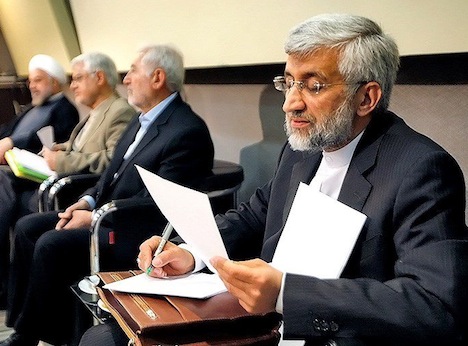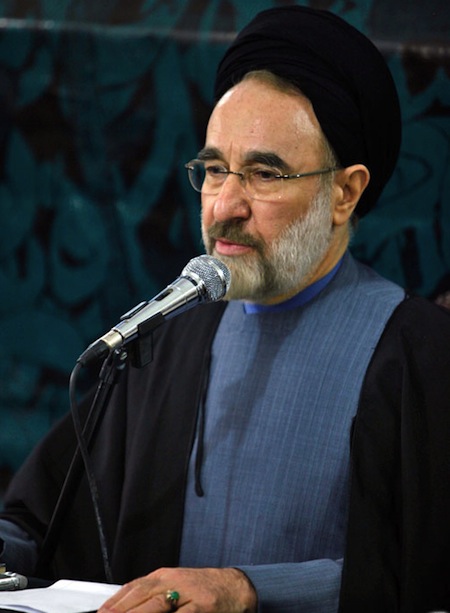It’s been a fast-paced 36 hours in Iran’s presidential election, with two of the eight approved candidates exiting of the race following Friday’s third and final presidential debate. ![]()
Monday brought news that Gholam Ali Haddad-Adel would drop out of the election, reducing the number of conservative ‘principlists’ competing for votes in the first round of the June 14 presidential race. Haddad-Adel, who served as the speaker of Iran’s Islamic Consultative Assembly (Majles) from 2004 to 2008, and whose daughter is married to the son of the Supreme Leader Ali Khamenei, did not specify an endorsement for any particular candidate, though he previously belonged to the ‘2+1 Principlist’ coalition that included former longtime foreign minister Ali Akbar Velayati and Tehran mayor Mohammad Baqer Qalibaf, and his exit from the race will likely mean fewer votes spread among Velayati, Qalibaf and Iran’s current top nuclear negotiator, Saeed Jalili (pictured above preparing for a recent presidential debate).
Today brings the news that Mohammad Reza Aref will also drop out in favor of moderate candidate Hassan Rowhani, which gives moderates and reformists a chance to unite behind one candidate. Aref, who served as communications minister and vice president under former reformist president Mohammed Khatami, allegedly ended his presidential bid after Khatami asked him to step down. Khatami has now endorsed Rowhani, who is seen as more of a moderate than a reformist. Rowhani is very close to former Iranian president Hashemi Rafsanjani, who was controversially disqualified in May to stand as a candidate in the current election by the Guardian Council. It’s a development that wasn’t entirely unexpected, and to the extent reformists and moderates don’t boycott the election entirely, it is very good news for Rowhani, who can try to unite to reformist and moderate camps in the hours ahead of Friday’s vote.
So where does that leave the six-candidate field? Realistically, it’s a five-man race. Though he remains a candidate, it’s hard to believe that Mohammad Gharazi could win. Although he served as Iran’s oil minister from 1981 to 1985 and as communications minister from 1985 to 1997, he’s a leftist in the mould of Mir-Hossein Mousavi, who served as prime minister in the 1980s before his resurrection as a reformist presidential candidate in 2009. He’s run a campaign focused largely on economic management and controlling inflation.
The remaining five — three principlists, another independent conservative and a reformist/moderate — are not so much vying to win outright on Friday so much as vying to win one of two spots in a runoff that will be held on the following Friday, June 21 in the event that no candidate wins over 50%. If that happens, as seems likely, there’s really no way to know who will emerge in the top two spots. Though polling is not incredibly reliable in Iranian elections, a recent telephone poll by the U.S.-based IPOS indicates 57% of Iranians have not yet decided but, among those who have, Qalibaf has a wide lead of around 40% against the remaining four candidate essentially tied for second between around 10% and 20%. That generally corresponds to other field polls, though Rowhani has led other similar polls. Rowhani has led the lion’s share of unscientific online polls since the campaign began in earnest, but those are even less reliable indicators of true support.
So what are the chances for each of those five candidates? Here’s a look at the pros and cons of each candidate, and how each would shape up in a potential runoff. Continue reading And then there were six: the dwindling Iranian presidential field


